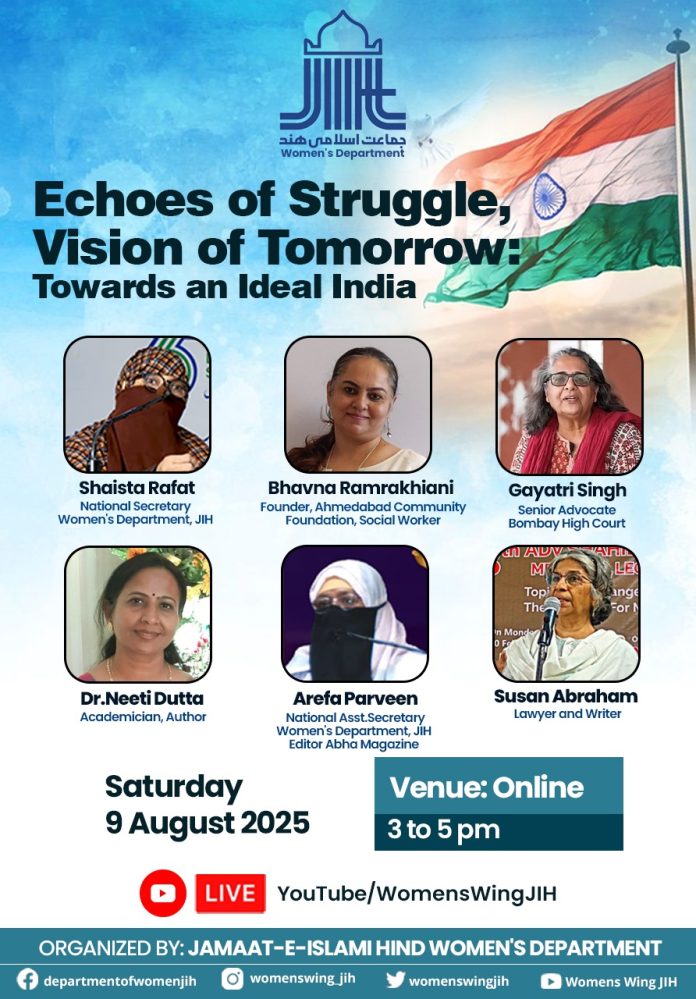New Delhi: As the nation prepares to celebrate yet another Independence Day, the Women’s Department of Jamaat-e-Islami Hind hosted an online national symposium titled “Echoes of Struggle, Vision of Tomorrow: Towards an Ideal India” on Saturday. The timing was significant as it came just days before the Independence Day; it served as a reminder that freedom is not only a historical achievement but also a living responsibility.
This symposium was designed to bring awareness about the unfulfilled vision of our freedom struggle to reflect on our history, confront present challenges, and work collectively towards a just, inclusive, and morally strong India. It echoed the sacrifices of the past and sought to inspire action for the future. The event was anchored gracefully by Mrs. Raziya Masood.
Shaista Rafat, National Secretary of the Women’s Department, JIH, brought together the spirit of the discussions into a heartfelt message. She emphasised that India’s independence was not merely political freedom; it was a moral and social triumph built on unity, dignity, and justice.
She reminded everyone that the journey toward an ideal India begins with the individual: “apne zaat se shuru kare” (start with yourself). This means restoring personal integrity, strengthening social values, and embracing active citizenship. Only when citizens are self-aware and morally committed can the nation as a whole progress.
Her words reflected the essence of the freedom struggle – unity in diversity and the responsibility to safeguard and nurture it for generations to come.
Meenaz Bhanu, Convenor of the Symposium Committee and Executive Committee Member, Women’s Department, JIH, took the audience back to India’s golden age, an era of flourishing knowledge, art, and prosperity. She spoke of how colonial rule disrupted this harmony and recalled the determination of leaders like Mahatma Gandhi, Aruna Asaf Ali, and Sarojini Naidu.
Even after 78 years of independence, she noted, the dream of an ideal India remains incomplete. Quoting the Qur’an (Surah Ra’d, 13:11) – “Indeed, Allah will not change the condition of a people until they change what is in themselves,” she reminded that real change begins with personal responsibility. This, she stressed, is the central purpose of the symposium: to awaken hearts and minds to the need for transformation.
Bhavna Ramrakhiani, Founder of Ahmedabad Community Foundation and social worker, shared stirring historical accounts from Uda Devi Pasi, the fearless sniper in the 1857 Battle of Sikandar Bagh, to Fatima Shaikh, the first Muslim woman teacher in India. Her message was to let go of the fear of “log kya kahenge” (what will people say), educate daughters, guide sons, and take responsibility for progress.
Dr. Neeti Dutta, academician and author, reflected on her grandparents’ memories of the freedom struggle. She observed that while political independence has been achieved, mental slavery to caste, religion, and language divisions persists. Using the example of Khadijah (RA), she encouraged independent thinking to “wear your own glasses” and refuse to be controlled by others’ perspectives.
Arefa Parveen, National Assistant Secretary of the Women’s Department, JIH, and Editor of Abha magazine, highlighted the paradox of India being the fifth-largest economy while grappling with violence against women, dowry deaths, and slow justice. She called for unity among women to spark a real revolution and envisioned a future where justice is timely and the nation can truly hold its head high.
Susan Abraham, lawyer and writer, connected India’s history with global struggles, from the pain of Partition to the ongoing Palestinian crisis. She warned that democracy is fragile, recalling the 1975 Emergency, and urged constant vigilance and solidarity to protect rights and freedoms.
The symposium reflected a deep truth that the “Echoes of Struggle” are not simply echoes of the past but living reminders of inclusion, compassion, and justice. The “Vision of Tomorrow” challenges every citizen to take part in shaping an India where equality and moral integrity are the foundation.
As the Independence Day draws near, the event served as both a tribute to the sacrifices of our freedom fighters and a call to action for today’s generation. The message was clear: the future of India will be shaped not by memories alone, but by the courage, unity, and responsibility we choose to live by today.




